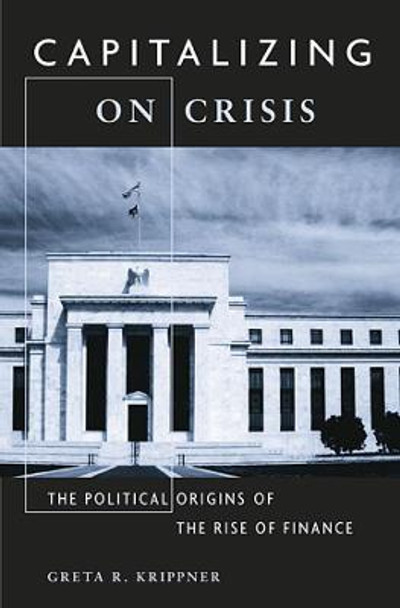Description
In the context of the recent financial crisis, the extent to which the U.S. economy has become dependent on financial activities has been made abundantly clear. In Capitalizing on Crisis, Greta Krippner traces the longer-term historical evolution that made the rise of finance possible, arguing that this development rested on a broader transformation of the U.S. economy than is suggested by the current preoccupation with financial speculation.
Krippner argues that state policies that created conditions conducive to financialization allowed the state to avoid a series of economic, social, and political dilemmas that confronted policymakers as postwar prosperity stalled beginning in the late 1960s and 1970s. In this regard, the financialization of the economy was not a deliberate outcome sought by policymakers, but rather an inadvertent result of the state's attempts to solve other problems. The book focuses on deregulation of financial markets during the 1970s and 1980s, encouragement of foreign capital into the U.S. economy in the context of large fiscal imbalances in the early 1980s, and changes in monetary policy following the shift to high interest rates in 1979.
Exhaustively researched, the book brings extensive new empirical evidence to bear on debates regarding recent developments in financial markets and the broader turn to the market that has characterized U.S. society over the last several decades.
With Capitalizing on Crisis, we finally have a persuasive account of the roots of the 2007-2008 financial disaster. While most studies focus on the proximate causes, Krippner makes sense of the dramatic expansion over decades of the financial sector of the U.S. economy. She explains brilliantly how and why government officials encouraged financialization as a way to solve the most vexing problems of our political economy. -- Fred Block, University of California at Davis In this wonderfully researched and tightly argued book, Greta Krippner shows how the expansion of the financial sector in the United States not only helped delay the 'day of reckoning' for spendthrift American households, corporations and government, but also conveniently depoliticized the distributional conflicts that had plagued the nation since the 1960s. Nobody expected these providential outcomes, not even the policymakers who had opened up this space for finance in a rather ad hoc fashion, through repeated efforts to fend off crisis. By the end of the process however, the markets were in charge, and government officials were only too happy --and relieved-- to follow their lead. Capitalizing on Crisis is an absolute must read for anyone who cares to understand the origins of our current financial quagmire and the distributional dilemmas that policymakers inevitably and uncomfortably face. -- Marion Fourcade, University of California, Berkeley
About the Author
Greta R. Krippner is Associate Professor of Sociology at the University of Michigan.
Reviews
With Capitalizing on Crisis, we finally have a persuasive account of the roots of the 2007-2008 financial disaster. While most studies focus on the proximate causes, Krippner makes sense of the dramatic expansion over decades of the financial sector of the U.S. economy. She explains brilliantly how and why government officials encouraged financialization as a way to solve the most vexing problems of our political economy. -- Fred Block, University of California at Davis
In this wonderfully researched and tightly argued book, Greta Krippner shows how the expansion of the financial sector in the United States not only helped delay the 'day of reckoning' for spendthrift American households, corporations and government, but also conveniently depoliticized the distributional conflicts that had plagued the nation since the 1960s. Nobody expected these providential outcomes, not even the policymakers who had opened up this space for finance in a rather ad hoc fashion, through repeated efforts to fend off crisis. By the end of the process however, the markets were in charge, and government officials were only too happy --and relieved-- to follow their lead. Capitalizing on Crisis is an absolute must read for anyone who cares to understand the origins of our current financial quagmire and the distributional dilemmas that policymakers inevitably and uncomfortably face. -- Marion Fourcade, University of California, Berkeley
Amidst the tsunami of books coming out in the wake of the recent financial crisis, Krippner's work stands out for its unusual approach. Rather than addressing the venality and incompetence of those with responsibility for regulating the economy, Krippner tells the history of the growth of financialization from the perspective of the regulators...In her account, the regulators were searching for ad hoc responses to what were deeper, perhaps even intractable problems. The high point of the book is her magnificent analysis of the erosion of Regulation Q, in which regulators cracked open the door to financial deregulation, unleashing the massive deregulation that came later. -- M. Perelman * Choice *
Awards
Winner of Viviana Zelizer Award 2012. Nominated for Allan Sharlin Memorial Award 2012 and Ellis W. Hawley Prize 2012 and OAH Frederick Jackson Turner Award 2012 and Hagley Prize in Business History 2012 and Gladys M. Kammerer Award 2012 and Society for the Study of Social Problems C. Wright Mills Award 2011 and Alice Hanson Jones Prize 2012 and J. David Greenstone Book Prize 2012 and PEWS Distinguished Book Award 2012 and William H. Riker Book Award 2012.
Book Information
ISBN 9780674066199
Author Greta R. Krippner
Format Paperback
Page Count 240
Imprint Harvard University Press
Publisher Harvard University Press




